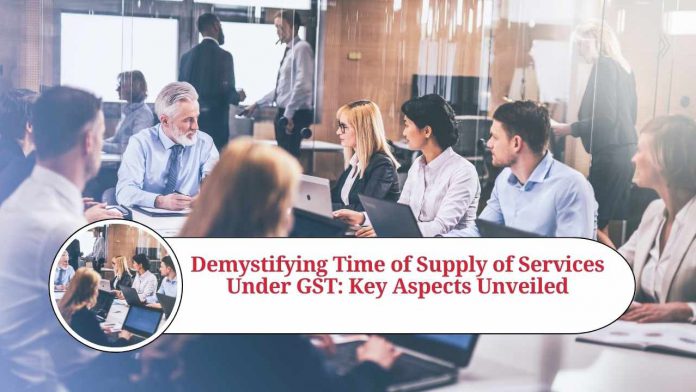Introduction
The Goods and Services Tax (GST) has revolutionized the taxation system in India, bringing about significant changes in the way goods and services are taxed. One important aspect of GST is the determination of the time of supply, which is crucial for determining the tax liability. In this blog, we will explore the concept of time of supply of services under GST and shed light on the key aspects associated with it.
Understanding Time of Supply
The time of supply refers to the point in time when a transaction is deemed to have occurred for the purpose of levying GST. It plays a vital role in determining the applicable tax rate, valuation, and the period within which the taxpayer must discharge their tax liability. The time of supply provisions under GST aim to ensure clarity, certainty, and accuracy in tax determination.
Time of Supply for Services
The time of supply for services is determined based on the earliest of the following three events:
- Date of Invoice: This is the date on which the supplier issues the invoice for the supply of services. It is important to note that the invoice must be issued within a prescribed time frame, which is generally within 30 days from the date of supply of services. However, if the supplier is a banking company or a financial institution, the time limit for issuing the invoice is extended to 45 days.
- Date of Payment: If the invoice is not issued within the prescribed time frame, the time of supply will be determined by the date of payment. In such cases, the time of supply will be the earlier of the date of payment or the date immediately following 60 days from the date of supply.
- Date of Completion of Services: If neither the invoice nor the payment is made within the specified time frame, the time of supply will be determined by the date of completion of services. The completion of services refers to the date when the services are completed or when they are deemed to be completed as per the terms of the contract.
Special Cases and Exceptions
There are certain special cases and exceptions to the general rule of time of supply. Let’s take a look at a few examples:
a. Reverse Charge Mechanism: Under the reverse charge mechanism, the recipient of services is liable to pay the GST instead of the supplier. In such cases, the time of supply is determined based on the date of payment, i.e., the date on which the recipient makes the payment to the supplier or the date immediately following 60 days from the date of supply, whichever is earlier.
b. Continuous Supply of Services: In the case of continuous supply of services, where the services are provided over a period of time and the value is determined periodically or on completion of specific events, the time of supply is determined as follows:
- Due date of payment: If the due date of payment can be ascertained from the contract, the time of supply will be the earliest of the due date or the date of payment.
- No due date of payment: If the due date of payment cannot be ascertained, the time of supply will be the date of completion of an event that triggers the payment or the date of payment, whichever is earlier.
Conclusion
The time of supply of services is a critical aspect under the GST regime, as it determines the tax liability, applicable tax rate, and compliance requirements for service providers and recipients. By understanding the various provisions and exceptions related to the time of supply, businesses can ensure accurate tax calculations and timely compliance with GST regulations.
It is essential for service providers to maintain a clear record of invoices, payments, and completion of services to determine the correct time of supply. Additionally, they must stay updated with any changes or amendments to the GST laws and consult with tax professionals.
Read more useful content:
- GST Rules and Regulations in India
- GST Software
- GST Billing Software
- Billing Software
- GST on diamonds
- Making GST Payments
- GST E-invoice
Frequently Asked Questions (FAQs)
What is the time of supply for services under GST?
The time of supply for services under GST refers to the point in time when a service is considered to be supplied for the purpose of determining the applicable tax rate and tax liability.
How is the time of supply determined for services?
The time of supply for services is determined based on the earliest of three events: the date of invoice, the date of payment, or the date of completion of services.
What is the significance of the date of invoice for determining the time of supply?
The date of invoice is important because it establishes the time of supply if the invoice is issued within the prescribed time frame. Generally, the invoice must be issued within 30 days from the date of supply.
What happens if the invoice is not issued within the prescribed time frame?
If the invoice is not issued within the specified time frame, the time of supply will be determined based on the date of payment or the date of completion of services, whichever is earlier.
Are there any exceptions to the general rule of time of supply?
Yes, there are exceptions. For example, under the reverse charge mechanism, the time of supply is determined based on the date of payment. Additionally, for continuous supply of services, the time of supply may be determined based on the due date of payment or the completion of specific events.
How does the time of supply work for services provided by banking companies or financial institutions?
For banking companies or financial institutions, the time limit for issuing the invoice is extended to 45 days instead of the standard 30 days.
What is the significance of the date of payment for determining the time of supply?
The date of payment becomes relevant when the invoice is not issued within the prescribed time frame. In such cases, the time of supply will be the earlier of the date of payment or the date immediately following 60 days from the date of supply.
How is the time of supply determined for services under the reverse charge mechanism?
Under the reverse charge mechanism, the time of supply is determined based on the date of payment, i.e., the date on which the recipient makes the payment to the supplier or the date immediately following 60 days from the date of supply, whichever is earlier.
What is meant by the completion of services for determining the time of supply?
The completion of services refers to the date when the services are completed or when they are deemed to be completed as per the terms of the contract. It becomes relevant if neither the invoice nor the payment is made within the specified time frame.
What are the implications of incorrect determination of the time of supply for services?
Incorrect determination of the time of supply can lead to errors in tax calculation, resulting in potential penalties, interest, or compliance issues. It is crucial for businesses to understand and comply with the time of supply provisions to ensure accurate tax reporting.




















